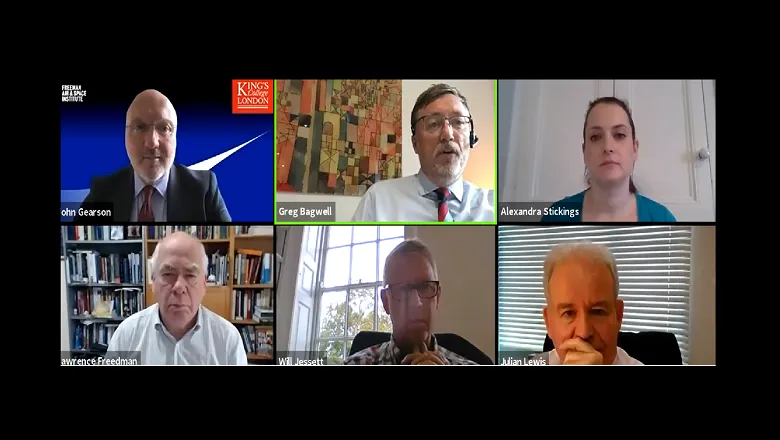24 September 2020
New research institute on air and space power launches at King's College London
At the launch event politicians, former civil servants and air and space experts discussed UK defence policy

The Freeman Air and Space Institute (FASI) was launched at an online event this week involving involving politicians, former civil servants and air and space industry professionals.
Based in the School of Security Studies, King’s College London, and set up thanks to funding from the Royal Air Force through Dstl (the Defence Science and Technology Laboratory), FASI will explore the ways countries and international organisations are developing security and defence capabilities for air and space.
At the launch, Professor John Gearson, Director of the Institute, introduced its vision and aims, leading to a discussion on the future of UK air and space defence policy, with speakers including Peter Watkins, former Director General (Strategy & International) at the MoD and Mark Phillips, former special advisor to the Security Minister. This was followed by a roundtable on the government’s ongoing Integrated Review into Defence, Security and Foreign Policy, featuring Emeritus Professor Of War Studies, Sir Lawrence Freedman, Julian Lewis MP, former Chair of the Defence Committee and Alexandra Stickings, Research Fellow at RUSI.
A new research paper was also unveiled by Dr David Jordan, institute Associate Director, looking at the future of UK aerial defence and exploring this in light of the Integrated Review. Dr Jordan expressed concerns that traditional defence capabilities and equipment will be thrown out in favour of increased spending on projected technological advances in the realms of cyber, space and artificial intelligence (AI).
He said:
“Without a balanced approach blending new technologies with long-standing principles, the UK risks becoming excessively dependent upon its allies, undermining the aspiration to be a ‘Global Britain’ seeking to demonstrate that ‘we are the best possible allies’ and ‘an even stronger force for good in the world’.
Commenting on Dr Jordan’s analysis during the roundtable on the Integrated Review, Julian Lewis said:
“This exercise is going to be a cover for cuts…it’s going to be done under the aegis of a claim that new 21st century threats have made old 20th century technology unnecessary.”
He added:
“It would be a terrible lesson to draw that our defence budget should now undergo further punishment as a result of the Covid crisis on top of its already manifest inadequacy.
“Keeping country safe from predictors as well as pandemics requirements major peacetime investments.”
Professor Lawrence Freedman said:
“We are becoming more ambitious in looking at certain areas that have a strong technological input…going more for drones, cyber and space.
“Something has got to give to make room for these…there’s always that nagging worry…[that] any capability which you decide is surplus to requirements in the year of the review is likely to be absolutely necessary the next year.
He added:
“My guess is…The budget will not be cut but in fact will grow…this will not be seen to be a good time to be cutting back on defence”
The Freeman Institute will publish a series of research papers and host a regular programme of events and roundtables enabling UK and international air and space experts to disseminate research findings and engage with key stakeholders in government and the wider security community. These discussions will help to generate original and innovative insights, policy proposals and recommendations on the future of aerospace power.
The Institute is named after Air Chief Marshal Sir Wilfrid Freeman who was a key figure in British air capability development in the late 1930s and during the Second World War, playing an important role in the development of aircraft, including the Spitfire, the Lancaster and the Mosquito.
